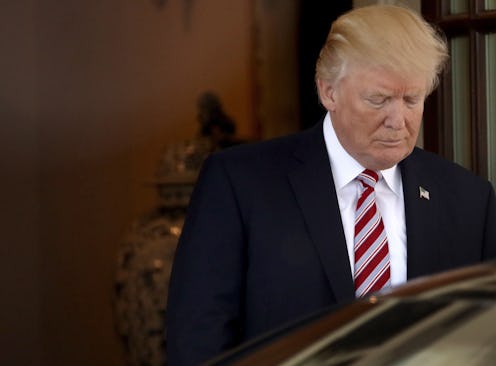News
Trump Is Far From Being Removed From Office

Never before in the history of the United States has a president been successfully removed from office via impeachment. The process itself has been used rarely — only a couple of times. Yet, between divisive executive orders, abrupt firings, and a suspicious relationship with Russia, the White House has many Americans wondering when impeachment proceedings could start for President Trump.
Despite the scandals that have plagued the Trump administration in recent weeks, impeachment may still be far off. After all, the impeachment process is used only rarely for a reason. It's a long and political process that requires action from both the House of Representatives and the Senate. Since Trump's inauguration, the Republican-led Congress has struggled to confirm the president's cabinet appointments and pass health care legislation. It's hard to imagine they'd find a quick way to remove the leader of the federal government.
To begin, the impeachment process requires a member of the House of Representatives to propose a list of impeachable charges. According to the Constitution, impeachable charges include "treason, bribery, or other high crimes and misdemeanors." If such charges are proposed, they can be referred to the House judiciary committee for debate. The committee can then refer the charges to the House floor at large for a vote. A simple majority vote to approve the charges is required to officially launch an impeachment trial, which would take place in the Senate.
Given the slow-moving legislative process in Congress, it seems unlikely that the House would successfully vote to impeach the president anytime soon. What's more, it seems even less likely that a Republican-led body of lawmakers would vote to remove a president from its own party. Trump might have to do much more than fire a few high-ranking government officials and allegedly interfere in an investigation to turn enough Republican representatives against him.
In fact, the Republican-led House may already be ignoring official proposals to impeach the president. Last month, the city of Cambridge, Massachusetts, passed a resolution that asks Congress to begin an impeachment investigation, which would determine if impeachable charges could be brought against Trump. More than a month later, Congress has yet to open or call for such an investigation.
In other words, Trump's presidency seems safe for the time being. Still, that's not to discredit the controversy he has created. Even some House Republicans — the very people who would need to vote to impeach him — seem tired of his ways. For instance, on Tuesday, Rep. Barbara Comstock of Virginia called reports of Trump sharing intelligence with Russia "highly troubling," according to Politico. Those concerns may not be enough to impeach the president, but keep an eye on the House of Representatives if you're waiting for the process to begin.